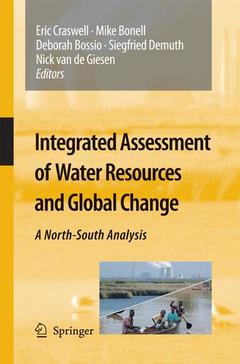Description
Integrated Assessment of Water Resources and Global Change, 2007
A North-South Analysis
Coordinators: Craswell Eric, Bonnell Mike, Bossio Deborah, Demuth Siegfried, van de Giesen Nick
Language: English
Subjects for Integrated Assessment of Water Resources and Global Change:
Keywords
Climate Change; Global environmental change; Groundwater; Integrated resources assessment; River basins; Scale; Virtual Water; Water Resources; Water resou; Water resource management; biodiversity; environment; environmental change; hydrology; integration; water quality and water pollution; hydrogeology
Publication date: 09-2014
373 p. · 15.5x23.5 cm · Paperback
Publication date: 01-2007
373 p. · 15.5x23.5 cm · Hardback
Description
/li>Contents
/li>Comment
/li>
How can the Earth?s finite water resources be managed sustainably to meet the growing needs of humans and of nature in ways that avert the looming crisis?
The pressing water problems must clearly be tackled from an integrated perspective taking into account environmental, human and technological factors and especially their interdependence. The key papers in this volume from the Bonn conference focus on the challenges of integrated assessment of water resources in the context of global change. The growing gap between North and South is also addressed, in terms not only of access to water and its quality, but also of the capacity to do research and implement solutions.
The coverage of the papers is up-to-date and comprehensive. Highlights include emerging concepts such as blue and green water, virtual water, the water footprints of nations, multi-agent modelling, linkages between water and biodiversity, and social learning and adaptive management.




